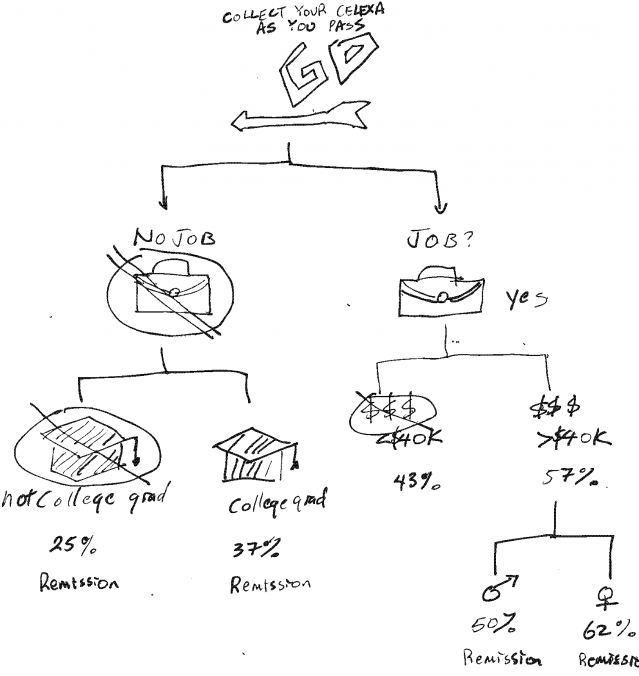SSRIs
Can We Predict Who Will Respond to Antidepressants?
Precision medicine might look like a game of monopoly
Posted August 22, 2014
Many people take antidepressants: as of 2013, one in ten Americans take antidepressants and among women in their 40s and 50s, the figure is one in four. Controversy has been constant: are they overprescribed? Do they even work at all? Critics like to point to the small effect size in large studies as evidence that antidepressants don’t work. What they really mean is that they don't work, as much as we want, on average.
But this "discovery", even if it were true, (which it probably isn’t) is trivial. It is pretty clear that antidepressants work, at times dramatically, for some people; but for others, they don't work better than a sugar pill. Whether antidepressants work on average says very little about if it would work for a particular patient.
This is where the medicine of 20th century ends. Practically every single treatment guideline in medicine as it stands, ends at comparing average treatment responses. We are now arriving at an impasse where “precision medicine” might come to our rescue.
The most definitive clinical trial as of today in treating depression is called Sequential Treatment of Alternatives to Relieve Depression (STAR*D) which was funded by the National Institutes of Mental Health and enrolled 4,041 patients. It provides a pragmatic algorithm for psychiatrists to treat depression with a variety of medications: medications that are familiar to everyone like Celexa, Zoloft and Effexor, and more complex medications that are unfamiliar such as lithium and tranycypramine. The bottom line result of STAR*D is that at the end of many different trials of medications, on average, about 50 percent of the patients achieve remission.
For any given patient, is the glass going to be half empty or half full?
Numerous subsequent studies find correlations of one or more predictors with treatment outcome in this highly complex study. Very few studies, however, addresses this simple question: for whom does citalopram (Celexa), which was chosen as the first medication to try, work? A hot-off-the press paper in Journal of Clinical Psychiatry [1] finally marches forward. Some of the results in that paper I have heard through the grapevine at various conferences, but the paper succinctly summarizes all these results using a method that they called “ROC analysis” but really would be more accurately termed Classification and Regression Trees (CART) or Decision Tree Analysis. The technical component of the paper has some potentially major issues (where is the cross-validation?), and it is clear that the reviewers at Journal of Clinical Psychiatry are not too strict with the various unusual and at times confusing nomenclature. We will let that all go for now. The premise is so simple that I cartooned the main results on a piece of paper.

Decision Tree of Antidepressant Response
If you have a job, you are more likely to respond to Celexa. If you have a job that pays more than 40,000 dollars, you are even more likely to respond. And, if you are a woman, have a job and make more than 40,000 dollars, you have the best shot of responding to Celexa. And if you are an unemployed, poorly educated person, good luck to ya because even the medications hate you.
This sounds more like monopoly and less like confusing college biology material with lots of big words like “G-protein coupled receptors” and “neurotransmitter release”. What gives?
Nobody really knows. There are lots of conjectures. A senior researcher I chatted with thinks that people who make more money and have a job are simply more "obsessional" and compliant with medications, and get more both from the placebo effect and the medication effect. There might be confounding factors due to unknown effects at randomization and selection of study subjects. (Please post your thoughts in the comments section!) What I want to believe, though, is that people who are employed and people who are not employed have different brains, but the difference cannot be detected with existing technology. What I also want to believe is you might not need complex technology to extract this information. All you need to do is ask a simple question: "are you currently employed?"
"Big Data" studies of antidepressant response prediction continue forward with tens of millions of dollars and complex MRI, neurophysiology and genetic data. On the one hand, we celebrate a future of massive datasets of International Study to Predict Optimized Treatment for Depression (iSPOT-D) and Establishing Moderators and Biosignatures of Antidepressant Response for Clinical Care (EMBARC). On the other hand, is it possible that what we are looking for is right in front of our eyes?
Reference
[1] Jakubovski E and Bloch, MH Prognostic Subgroups for Citalopram Response in the STAR*D Trial J Clin Psychiatry 2014;75(7):738–747


